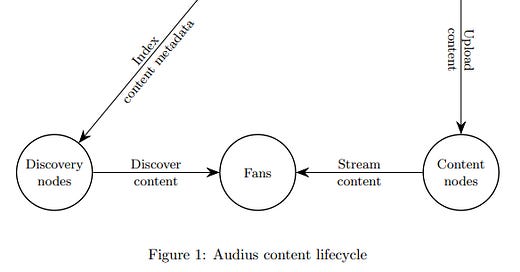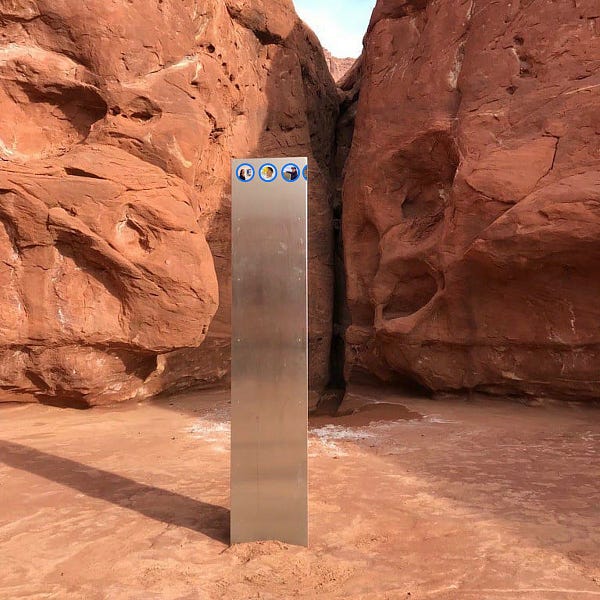✖ Music streaming as a protocol: why I was wrong about Audius
And: YouTube takes down Sinatra's cover of Britney; Dua Lipa's 5M attendee ticketed livestream; Sony Music Brazil's AI accelerator
Hi everybody,
First of all I want to give a big thank you to everyone who joined MUSIC x on Patreon. Every type of support is appreciated: whether that’s a share, a membership, or just a kind message, it always makes me glow.
Special shout out to everyone in the supporter tier: Bo Plantinga, C.Y, Casper Schadt, Jason Fahlstrom, Kalam, Maarten Walraven and Pete Cohen.
The patrons have spoken (by way of the backstage poll): next week (Tue, Dec 8) I’m sending out an update on the state of blockchain in music. Keep your 👀 eyes peeled for the ✖ in your inbox.
Love,
Bas
Music streaming as a protocol: why I was wrong about Audius
Last week I wrote about blockchain-based streaming platform Audius in this newsletter. I criticized the strategy of 'becoming the anti-SoundCloud' and its plans for dealing with takedowns while recognizing the exciting potential of a more complex music economy. The next day Holly Herndon and Mat Dryhurst released a new Interdependence podcast episode where they go in conversation with the Audius founders. It made me completely change my mind about the platform.
Don't be too quick to dismiss Audius: separating the content & functionality layer is one of the keys to unlocking a new music economy.
Protocol or platform, not service
Audius should be thought of as a decentralized platform rather than as a startup or streaming service. While there is a team behind the project, it seems they mostly work to bring into existence the components outlined in their whitepaper (PDF). These aspects are open-sourced and governed by the user community of the protocol.
While a service's success is dependent on whatever interface is slapped on to the technical infrastructure, a protocol is less dependent on any one interface. For example, a company poorly redesigning an email client isn't going to kill email, but it may kill the app or the company behind it. The most exciting aspect of Audius is not the current interface; it's that they're trying to create a protocol for digital music that could have any number of interfaces plug into it.
One of the most important elements of that protocol is a concept I was previously very skeptical about.
Artist-determined stream pricing
Audius wants to let artists set a per-stream rate for their tracks, so if someone wants $1 / stream, they could do so. If they want something close to whatever are the current average Spotify or Apple rates, that's possible too.
Why I was skeptical about per-stream rates is that it creates a form of metered streaming: load up your wallet and watch the currency tick away as you listen to music. If you're creating a SoundCloud lookalike (or: ‘like Soundcloud, but better’) to fit into the current landscape of streaming services, then metered streaming is a constraint that will inevitably scare users off. It won't just scare people off in the sense that they won't want to load up their wallet if they don't know what they're going to listen to yet, but more importantly it will have people make economical decisions about established micro-behaviours around music listening. I think in the end, that would be stressful and exhausting and users would stop coming back. However I’ve come to realize I'm wrong about this.
Differently priced music does not have to live in the same streaming interface. Lower-priced music might be what fuels background-listening type radio apps. Higher-priced music may be at the center of interfaces that connect you to new releases by your favourite artists. There are some pieces of classical music that I listen to maybe once a year, that I value more than some music that I listen to weekly. Per-stream pricing could help make up for the fact that that classical piece gets only 1 yearly stream from me versus 52 streams for a random track — whose creator I don't even know — in a playlist I use to focus on writing.
What Mat and Holly communicate very well in their podcast with Audius is that 'music' is not one thing, yet the online landscape doesn't reflect that fact well. To some degree, the compensation model embedded in the licenses dictates a lot of the user experience. In the past I've led teams at two music streaming services wanting to do things differently and while you can go quite a long way, in the end you have to exist in a landscape dictated by just one economic game: maximization of streams.
A change to that landscape would be refreshing and a welcome way to generate more revenue streams.
Content / interface-layer challenges
There is still a whole range of challenges to deal with in such a system. Who sets the per-stream price for example? Is it whoever has the highest degree of ownership of the sound recording? What if they change the price while it’s live and because of that the track is no longer playable through certain interfaces? Or if it all lives in the same interface: do you interrupt playback to give people a warning before an expensive track starts playing? What if their phone is in their pocket? These are just some of the design problems developers would have to think about in a decentralized system with such principles.
It’s possible that the decentralization of the functionality layer doesn’t go as far as I imagine. In any case, Audius or the apps using the protocol will have to deal with the existing national and international copyright regimes which inevitably dictate some of the economics.
In the end, it’s not about Audius versus SoundCloud; it’s about creating a new layer for music streaming. Imagining music streaming as a protocol, rather than a competitive space of services, is refreshing though. It allows for a rethink of the principles underpinning the digital music landscape without going through the arduous mental exercise of imagining small iterative improvements to solve streaming’s flaws.
Enjoying the read? Get updates like these in your inbox twice a week:
TECH
💳 Mark Mulligan and Keith Jopling make a case for moving beyond the current ‘song economy’ arguing that:
“Record labels and publishers with large catalogues benefit from scale in a way that artists and songwriters do not, unless they have a megahit – and although streaming is great for megahits, they are few and far between.”
💵 I’m a fan of Currents.fm, because they’re constantly finding cool ways to create extra revenue streams around existing user behaviours in the digital music landscape. A good example is their partial pay-it-forward tipping:


🎤 The creative artificial intelligence duo of Dadabots got an AI Frank Sinatra to sing Britney Spears’ Toxic. “Fair use” claim the creators, but YouTube took it down. The takedown was refuted and the team now find themselves in complicated legal territory.
🇧🇷 Sony Music Brazil has launched an accelerator for artificial intelligence. It kicked off with the (supposed) first hackathon ever organised by a major music company in the country. The three winning projects of the hackathon will now work closely with Sony to scale their projects.
🕹 The long anticipated game Cyberpunk 2077 will feature a ‘streamer mode’ that will automatically replace some songs from its catalogue with stream-friendly songs to avoid gamers facing takedowns on Twitch and YouTube.
CORONA
🌐 Dua Lipa has drawn an amazing 5 million viewers to her ticketed livestream, with tickets priced at $10.
🍏 Apple has extended its deadline for having livestream-related transactions happen through its own in-app purchases. What it means is that they won’t be taking their usual 30% cut, until July 2021 that is.
🌱 European indie music association IMPALA has released a list of recommendations for the current second wave. It includes a demand that countries earmark 6% for the recovery of culture sectors, calls for more coordination and transparency, and emphasizes the role the music sector can play (PDF link).
🇧🇪 In Belgium, festival organisers are offering support to the government to roll out vaccines. Governments could definitely put to great use the sector’s valuable expertise in crowd management, pop-up structures, and networks of unemployed technical staff.
🐀 TikTok users, including Broadway professionals, are making an organic minute-by-minute musical remake of Disney’s Ratatouille. There’s a sentence I never thought I’d type.
Music
Contrary to popular belief, I have a good taste in music. What I also have is a very bad taste in music. In the spirit of the latter, I would like to recommend a mix my friend s1m0nc3ll0 put together. It’s composed of ‘GUN SYNC’ which is a type of meme or remix culture where people add lots of gun shot sounds from video games to the beats of songs. The result is, well… silly.
Watch out for the Sandstorm remix around the 45-minute mark.
Bonus meme
Spotify and Twitter are the latest services with stories. Now they’re joined by a more recent entry into 2020’s pop culture.
MUSIC x, founded by Bas Grasmayer and co-edited by Maarten Walraven.
❤️ patreon - twitter - musicxtechxfuture.com - musicxgreen.com






